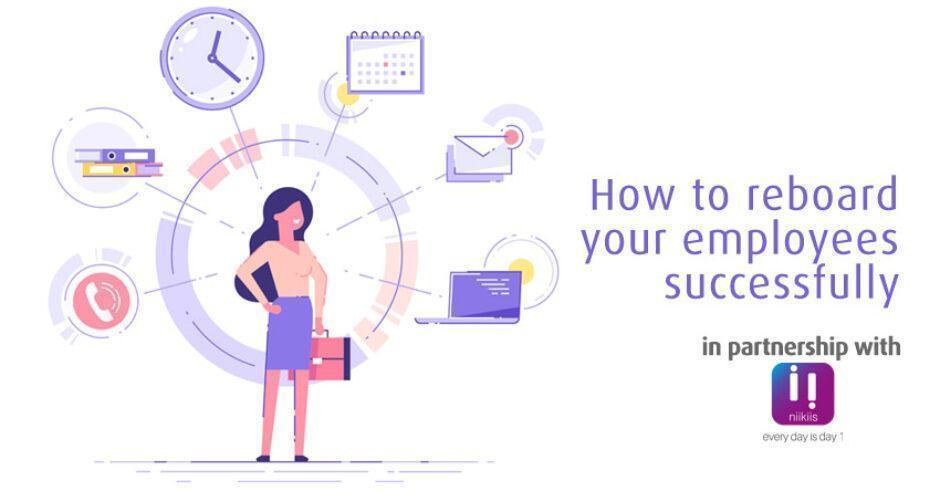Back to a new normal
COVID-19 has forced us to adopt new ways of working based on effective communication and trust. From remote work to digital transformation and the creation of a renewed company culture and processes, many challenges arose leaving companies no time to address the economic impact of digital disruption not to say topics such as employee engagement and well-being. Now, as we enter the new normal, new questions strike HR professionals, namely, how is going to be the return to work and what will be companies’ biggest challenges as they enter the future of work.
In a blink of an eye, reboarding processes have become an essential part of the employee onboarding journey. Still, to adapt themselves to the future of work and stay competitive organizations will have to apply the many lessons learned during the pandemic.
First, learn your lessons well
The 2020 Global Human Capital Trends Deloitte report and a recent Josh Bersin’s article advise companies to:
- Adopt a people-focused approach rather than economics: only when HR departments fully understand their employees, will they be able to increase their sense of belonging and performance. People aspire to find meaningful jobs at companies that value their opinion.
- Develop employee well-being: in times of uncertainty and change, promoting a culture of open communication and dialogue that works mainly focused on outputs rather than tasks is a safe bet to nurture employee well-being and collaboration.
- Understand data. data analysis provides companies with insightful information on their employees’ strengths and needs to personalize and enrich their onboarding programs, encourage employee performance, and assess employees’ health. Besides, this data can help organizations identify in forehand which jobs will soon disappear within the company so that specific training for new positions can be launched fast and effectively. Shockingly, only 10% of companies say to be ready for reskilling internally over the next 12 to 18 months, whereas 38% states that identifying employee development needs is their main barrier to employee development. On the other hand, 53% of companies agree that between half to their entire workforce will need reskilling training in the next 3 years.
- Mix people with technology: integrating people with technology will be crucial to remain competitive not only in terms of business but also to increase employer branding.
- Exchange knowledge: organizations need to create company cultures based on knowledge generation and sharing to build stronger relationships and strengthen people’s resilience to distressing situations like the one we are experiencing. Only about 75% of the surveyed companies considered creating and preserving knowledge important or very important for their success over the next 12 to 18 months, while only 9% are very ready to address it.
- Train and empower your workforce: create training programs based on employee potential and not exclusively on skills to boost growth and acquire new skills so that they are ready for challenging situations in the future.
- Launch rewards programs: being transparent, fair, collaborative, and showing purpose will allow organizations to increase employee performance and motivation.
- Use real-time data: identify problems as soon as they start, stay in the loop of your employees’ progress, skills, and well-being, ask the right questions at the right moment, and these learnings to promote business growth. Only 11% of organizations have access to real-time information, whilst 43% have access to it sometimes or never.
- Tackle ethical issues: ethical issues are gaining importance; thus, organizations should anticipate them. (e.g. workforces such as the gig economy).
- Allow HR lead change: HR departments should actively help organizations improve the way they work and lead business alongside management. Moreover, the pandemic has not only brought CHROs and HR departments to the forefront, nowadays, everything revolves around employee experience: from recruiting, hiring, and onboarding new hires to the company, analyzing employee sentiment and engagement, building great relationships, foster employee’s well-being, and so on.
Strategic HR leadership
The pandemic cast a new light on HR, unveiling it as one of the most important jobs today to lead change and help companies adapt their current workforces to future-to-come challenges. The new HR role will imply identifying and understanding all business areas that require support to thrive. The new world of work will reward companies with different mindsets, in which values such as purpose, potential, and organizational impact on employee experience gain particular importance.
If reboarding your workforce is a top concern for you or you just need an onboarding platform to help you and your HR department save time and money on your onboarding programs, contact niikiis here.
The Business Transformation Network have shared this article in partnership with niikiis.




